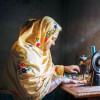Let us prevent preventable vision loss

Today marks World Sight Day—a crucial opportunity to reflect on the importance of vision and its profound impact on our lives. Sight is often taken for granted, yet it is the dominant sense through which we experience and interpret the world. We are reminded of the value of eyesight once more when reflecting on the hundreds of individuals who lost their vision from bullet injuries during the uprising in July and August this year. These people, many of them young, were fighting for justice and a brighter future, yet they were met with violence that affected their lives forever. The streets, which should have been filled with the promise of change, became battlegrounds where their sight was stolen in an instant. Their courage, even in the face of this profound loss, should fuel our fight for a future where everyone can protect, preserve, and celebrate the gift of sight.
Globally, visual impairment affects millions, and without urgent intervention, the number of individuals living with blindness could triple by 2050. In 2020, the Nationwide Blindness Survey published by National Eye Care revealed that 19 out of every 100 adults aged 30 and above in Bangladesh had some form of visual impairment. This stark statistic mirrors the global challenge—1.1 billion people worldwide live with untreated or preventable visual impairment, according to Sightsavers. Alarmingly, more than 2.2 billion people globally are visually impaired, with over half of these cases being preventable or treatable. A lack of access to quality eye care services means that millions are deprived of the care they need.
The loss of sight affects every aspect of life. For a child, it can mean missing out on an education and the joys of social interaction. For an adult, it can mean losing independence, mobility, and the ability to earn an income. Vision loss thus carries profound social and economic implications, and World Sight Day aims to raise awareness about the importance of ensuring equal access to eye care for all.
Low- and middle-income countries bear the brunt of this crisis. In Bangladesh alone, approximately 27 million people were living with some form of vision loss in 2020, nearly one million of whom were completely blind according to the Vision Atlas of the International Agency for Prevention of Blindness. The country faces a significant eye care crisis, driven by high levels of poverty and a lack of awareness. Cataracts, a condition that is easily treatable, remain one of the leading causes of blindness in Bangladesh, with more than half a million adults affected. Immediate action is required to prevent needless vision loss, yet eye health continues to be an under-prioritised issue.
Eye care has the potential to transform lives. Access to quality services can empower individuals, enabling them to learn, work, and contribute to society. It can alleviate poverty, reduce hunger, and improve overall well-being. The economic implications of poor eye health are vast. The Lancet estimates that visual impairment and blindness result in a global productivity loss of $410.7 billion annually. From diminished workplace productivity to children struggling in school due to undiagnosed vision problems, the ripple effects are significant.
Despite these challenges, Bangladesh has made notable progress on the international stage. On July 23, 2021, the United Nations General Assembly (UNGA) adopted the groundbreaking resolution "Vision for Everyone: Accelerating Action to Achieve the Sustainable Development Goals," committing the global community to address eye health for the 1.1 billion people living with preventable vision loss by 2030. Bangladesh played a pivotal role in advocating for this resolution as the chair of the Friends of Vision group, underscoring the importance of eye health as a development and human rights issue.
As Bangladesh graduates from its status as a least developed country (LDC) and transitions into a middle-income nation, it must prioritise the elimination of avoidable blindness. The country's future depends on ensuring that all citizens, from children in primary schools to elderly individuals, have access to comprehensive eye care services. Eye health should be integrated into the nation's healthcare delivery system and extended to the most vulnerable populations.
To achieve this, several key measures are essential. The government must take actions to incorporate eye health into the national health systems, including service delivery, healthcare financing, and supply chains, and ensure that eye health is considered in policies across education, labour, finance and other relevant ministries. Authorities must also prioritise primary and community care models to enable broad access to services and strengthen coordination across health sectors such as neonatal care, noncommunicable diseases, rehabilitation, and elderly care. Finally, digital health information systems (DHiS2) for eye health should be fully utilised to ensure efficient data management, planning, and progress tracking. In addition, civil society involvement is needed to raise awareness and advocate for the implementation of integrated, people-centred eye care (IPEC), and empower communities to take charge of their own eye health needs. It is also important to promote research to generate evidence that supports effective eye care interventions and integrate eye health into public health planning curricula. Plans must be in place to reach elderly persons, people with disabilities, minorities, ethnic communities and other marginalised groups, including garment workers, tea garden workers, and people living in hard-to-reach areas to ensure delivery of inclusive eye care services. Furthermore, rehabilitation plans are needed to ensure people with vision impairment and blindness can exercise their rights, participate in society on an equal basis, and take part in income generating activities.
As we commemorate World Sight Day 2024, we are reminded that sight is not just a physical ability—it is a pathway to opportunity, dignity, and participation in society. The tragedy of the people who lost their sight during the recent student movement is a solemn call to action. Their loss highlights the urgency of ensuring that no one else is forced into darkness, whether through violence or preventable conditions.
Bangladesh stands at a pivotal moment. As the country transitions from least developed to middle-income status, we have the opportunity to make avoidable blindness a thing of the past. By prioritising eye health as an essential component of our healthcare system, we can ensure that every citizen, regardless of their background or location, has access to the care they need. The global commitment to eye health through the UN resolution offers us a roadmap, but the work must start at home. Let this World Sight Day be a turning point—not just a day of reflection, but a day of renewed dedication.
Ayon Debnath is a development practitioner currently working with the Royal Commonwealth Society for the Blind (Sightsavers) as a campaign adviser. He can be reached at [email protected].
Views expressed in this article are the author's own.
Follow The Daily Star Opinion on Facebook for the latest opinions, commentaries and analyses by experts and professionals. To contribute your article or letter to The Daily Star Opinion, see our guidelines for submission.

 For all latest news, follow The Daily Star's Google News channel.
For all latest news, follow The Daily Star's Google News channel. 










Comments